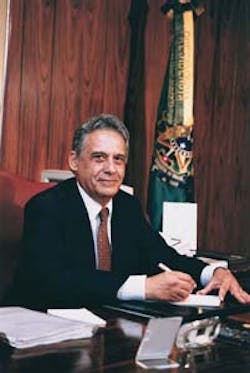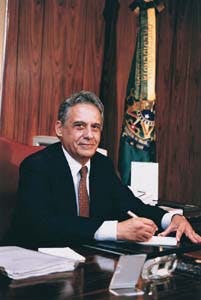INTERNATIONAL FOCUS
Brazil's President Fernando Henrique Cardoso.
The Brazilian metamorphosis
Privatization continues to percolate in South America, following the leadership of Argentina. Witness the changes, though slight, in Venezuela, Peru, Ecuador, and perhaps even Mexico. Now, under the far-sighted leadership of President Fernando Henrique Cardoso, it appears the sacrosanct state monopoly on oil exploration, development, production, transportation, refining, distribution, and import and export, now held by Petroleo Brasilerio - Petrobras - is nearing an end, and that foreign and domestic participation will begin - perhaps as early as next year.
Not only that, but Petrobras, itself, may be opened up to private ownership, albeit not majority ownership, which will be maintained by the Brazilian government. Likewise, it is the government's intention to hold majority interest in all producing and discovered reserves.
Cardoso challenged the nationalists who opposed any foreign ownership of Brazilian patrimony, particularly its petroleum industry, by submitting a proposed amendment to the Brazilian constitution in February that would begin the privatization process. This, in recognition of the country's severe need for increased capital investment in order to carry out important industry programs, including development of the country's enormous oil and gas reserves.
As a consequence, Brazil's militant oil workers launched an anti-privatization strike that wrought severe hardship on the country, loosing their base of support in the process. Thus, when Brazil's lower house of Congress, the Chamber of Deputies, brought President Cardoso's constitutional amendment to a vote June 7th, it passed, as much in favor of the proposal as in opposition to the strike.
On June 20th, the amendment proposal passed a second time with well over the three-fifths majority needed, and is now awaiting two anticipated approvals in the Brazilian Senate. It then becomes law, but to put it into effect will require the passage of other laws governing the role of the new Petrobras and the operating terms and taxes that would be applied to foreign participants in the Brazilian petroleum sector.
Multinational oil companies can be expected to show tremendous interest in participation with Petrobras in such prospects as the Campos and Santos Basins, but these are the plums that will likely be used to entice them into other less explored areas, such as the northeast and far south. Deepwater development takes deep pockets, however, so some capital involvement in the Campos shouldn't be ruled out.
China Incorporated
The transformation of China into a market economy with Chinese socialist characteristics is approaching a new stage vis-a-vis the petroleum industry. The State Commission for Restructuring the Economy (SCRE) is soon to receive a reform proposal developed by China National Petroleum Corp. (CNPC) and the international consultancy Coopers & Lybrand that would continue government ownership of CNPC, but not its control. It might even permit minority private ownership of its stock. A new division of the State Council would oversee the petroleum industry and establish policy, while the new CNPC would become an onshore operator and a stockholder in its current subsidiaries and other companies.
China National Offshore Oil Corp., the country's principal offshore operations organization, and the Bureau of Petroleum & Marine Geology (BPMG), which has both onshore and offshore responsibilities, would both be transformed into quasi-private operators themselves, under the plan, as it is currently understood. They would have their majority interest held by CNPC, but could conceivably be partially owned by private investors.
But don't look for CNPC or CNOOC on the New York or Tokyo Stock Exchange or even the Shanghai Bourse any time soon. Once the restructuring is approved by SCRE, it still has to be okayed by both the State Commission on Economics & Trade and the Ministry of Finance before it is considered by the State Council. It is a long process, but typical of China's gradual approach to reform of its state enterprises.
Rig use soars worldwide
Led by the Gulf of Mexico and, to a lesser degree, by the North Sea, world offshore rig utilization has reached 86%, a lofty level only witnessed twice in the past 12 years. Salomon Brothers attributes this to jackup demand in the US Gulf, where 20 additional units have been required over the past six weeks, and to the currently contracted 144 rigs. In the North Sea, utilization has held at 90% or above most of this year, with 71 rigs contracted.
West Africa, Middle East, and Asia-Pacific regions are holding firm in utilization, leaving only Latin America with signs of weakness. All this in response to demand growth in most of the world's major offshore drilling markets, where more balanced market conditions are expected to continue.
As a consequence, Salomon Brothers predicts 90% utilization next year, with sharply rising day rates due to several factors:
Demand growth by about 3%.
Supply contraction by about 2%.
Stable oil and gas prices.
Increased upstream spending by major and independent oil companies.
Declining US and international land drilling.
Trend toward offshore, versus onshore.
An incentive to decolonization
Argentina and the UK discussions about the exploration and exploitation of the Falkland/Malvina Islands have again been without any real resolution vis-a-vis cooperation or sovereignty, but Argentina has thrown a new twist into the situation. The Argentine government is now offering current residents of the Falkland/Malvinas Islands up to $800,000 per family to vote against British sovereignty. Britain's local governor poo-poohs the proffer, maintaining that "British subjects" would never sell their citizenship. To the sheep farming Falklanders, who endure a hard life in those far-flung islands, the prospect of a better life that money could buy may be more than they can resist. Regardless of this possibility, Argentine Foreign Minister Guido di Tella is threatening legal action against companies signing oil contracts with the present Falkland government.
Briefs...
Americas:
Canada's Newfoundland discovery in the Gulf of St. Lawrence onshore/offshore Port au Port Field drilled by Hunt Oil is heightening interest in the area. Mobil is considering drilling its adjacent block, and the Hunt-PanCanadian JV are renewing their nearby options.
Brazil's Petrobras is looking for an $180 million converted semi FPS now that it canceled the bidding round for it because only one offer was presented. The company can now negotiate directly without the formality of bids.
Mideast:
Egyptian General Petroleum Corp. has announced its 1995 bid round, which includes three major offshore blocks. On offer are an onshore and offshore block abutting the Libyan border and the Matruh block, with 10,800 sq km off the Western Desert in the Mediterranean, as well as the 15,000 sq km Mersa Alam Block in the Egyptian Red Sea.
Egypt's Gulf of Suez Gebel El Zeit concession, held by Marathon Oil, has been proven successful in a program of onshore horizontal drilling to beneath the Gulf. The field's second well tested at 4,358 b/d. Production is set for end-of-year.
Qatari coup could bode ill for stability in the Arabian/Persian Gulf. Shaikh Hamad bin Kalifa al-Thani, who ousted his father the Emir Kalifa on June 27th, promises status quo. However, in 1992, he threatened Saudi Arabia over a border dispute, opened relations with Baghdad, almost broke with the GCC, offered LNG to Israel, and opened talks with Iran.
Azerbaijan has awarded its Karabakh Field in the Caspian to a group composed of Lukoil (32.5%), Pennzoil (30%), Agip (30%), and Socar - the state oil company - (7.5%). The production sharing agreement is to be signed soon.
Asia:
Malaysia's Guntong Field is now producing at 100,000 b/d oil. Exxon holds 78% of the field, Petronas the remainder. A total of 40 wells are planned for the Guntong D platform, the latest of four to be installed.
China's largest offshore field, Suizhong 36-1, in Bohai Bay, is now onstream and expected to produce 1.0-1.4 million tons of crude oil per year. The field contains some 48 wells, with more being drilled. Phases II and III of development are set for the next three years. Estimated reserves are 300 million tons.
China has two more fields onstream this month in the South China Sea's Pearl River Basin, Huizhou 32-2 and 32-3. Output began with about 50,000 b/d, set to rise to 60,000 b/d later this year. ACT (Agip, Chevron, Texaco) is the operator, with 51% held by CNOOC.
Vietnam has chosen Block 15-1 potential concession winners. Mobil, BP/Statoil, and Geopetrol, if its to be a joint venture with PetroVietnam; BP/Statoil, Geopetrol, and a Pedco-Exxon-BP/Statoil consortium if it's to be a PSC.
Pacific:
Australia's Bass Strait will see three wildcats within the next few months: Gudgeon-1, Orange Roughey-1, and Smiler-1, all a part of the 40-well program set for the area by BHP/Esso. An appraisal well is also set for the Moonfish Field.
Fiji is offering concessions in three licensing blocks: A, in the Bligh Bight between Viti Levu and Vanua Levu, the main islands, D, south of Vanua Levu, and C, in the southern Lau Island Group east of the Koro Sea.
Vanuatu oil reserves have been indicated by both seismic and geological evaluations financed by the Australian Geological Survey Organization and Seistend, of Australia. Petroleum potential is indicated around the island of Santo and Malekula similar to that of Southeast Asia.
Africa:
Nigeria's Kpono West Field discovery well drilled by operator Mobil has tested 17,000 b/d. The NNPC-Mobil joint venture lies in just 150 ft water. It is the latest in a series of major discoveries Mobil has made in Nigerian waters this year.
Europe:
The UK's West of Shetlands Sheihallion Field, said to hold 250-500 million bbl oil, is beginning development by BP and Shell. Contracts have been let for the design of a FPSO to be installed on the field in 1,000 ft water. BP and Amerada are also cooperating on extended well testing on the field. First production is set for late 1997.
Barents Sea prospecting by Norway has cost the country $1.6 billion to date without any commercial discoveries. Energy Minister Jan Stoltenberg says it will, nevertheless, continue by state-owned Statoil, and Norsk Hydro.
Russia's Schtockmanovskoye gas giant in the northern Barents Sea arctic region, may yet be developed. Gazprom has invited Norsk Hydro to negotiate development, now that is has seen local organizations simply don't have the technology or knowhow.
Portugal is having little success in its offshore explorations. Only Sweden's Taurus Petroleum continues to hold a license area, on the northern border with Spain, and, although rumors last year had a sizable discovery made on the Touro Field, nothing more has been said.
Georgia drilling has sparked considerable interest in farming-in into JKX Oil & Gas's Black Sea joint venture. Drilling started in February, and results, as yet unannounced, appear to have been very good. Shell Pecten has already farmed-in, and other majors are lining up. "Georgia has potential for an awful lot of oil," said JKX MD David Robson.
Romania's Black Sea Block XV has produced a successful well for operator Enterprise Oil. The Doina-2 well tested 17.5 Mmcf/d gas. It was the third drilled there by the semisubmersible Ocean Liberator in the last five months.
Copyright 1995 Offshore. All Rights Reserved.

